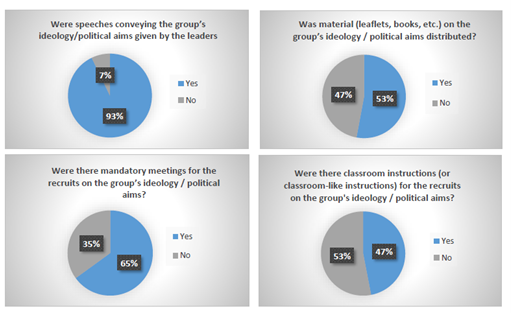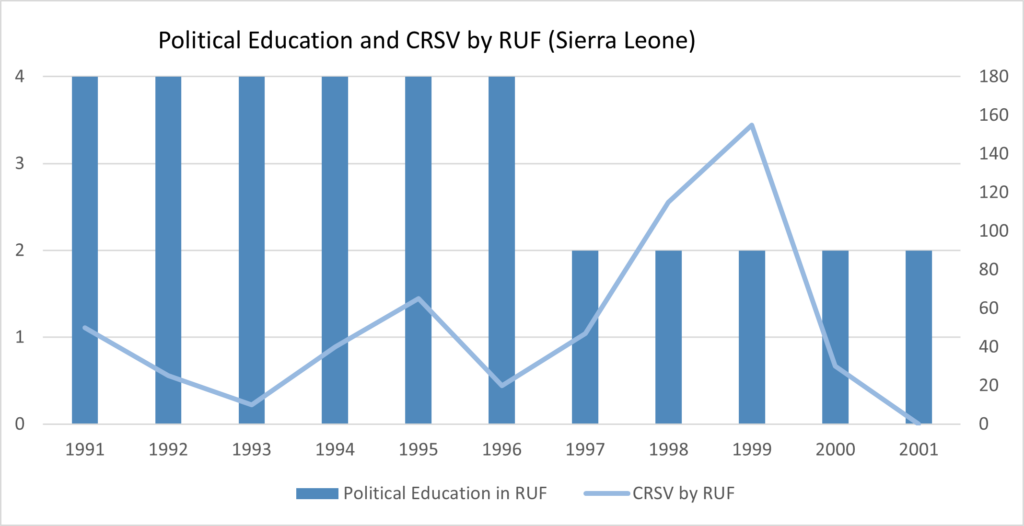
Amelie Freiberg
@AmelieFreiberg
“the SOPERG data project presents analytically novel avenues through which to deepen understandings of the nuanced impacts of political education activities within rebel groups.”
How do socialisation practices shape conflict-related sexual violence (CRSV) in rebel groups? This blog focuses on rebel groups’ varied use of political education and its implications for engagement with violence. It contributes to the Civil War Paths “Building Bridges” series in two ways: it draws attention to norms of restraint within rebel groups; and sketches the novel quantitative data on patterns on nonviolent socialisation in rebel groups.
Socialisation and Violence
Rebel groups frequently employ a range of violent activities including attacks on civilians, looting, and CRSV. Scholars have explored institutional and individual factors that contribute to these violent behaviours with a recent emphasis on socialisation. According to combatant socialisation theory, rebel groups resort to CRSV, and particularly gang rape, to socialise fighters and increase unit cohesion. Conversely, as a socialisation practice, political education (PE) has the ability to replace violent socialisation through CRSV and lower rebel violence.
How does political education look like?
Understood as ‘formal instruction that explains specific social or political purposes of a particular conflict, and connects conflict purposes to specific behavioural norms’, PE can take many forms and involve different actors within armed groups. It can range from direct instruction, mandatory meetings, or structured conversations about the meaning and purpose(s) of war or violence by armed group leaders to learning materials including leaflets and books. These practices instil a sense of commitment and loyalty to the group’s cause and create a shared understanding of the group’s goals.
Introducing the SOPERG Data Project
While we know that PE as a system of non-violent socialisation practices deters the use of CRSV among armed groups, we lack comparable data to analyse this phenomenon cross-nationally. The Socialisation and Political Education in Rebel Groups (SOPERG) Data Project starts filling this gap with information on the efforts, methods, and variation of political education practices within rebel organisations in African intrastate conflicts between 1989 and 2021. Combined with the Sexual Violence in Armed Conflict (SVAC) database, it will enable research on variations in rebel behaviour based on socialisation patterns, their intensity, and the relationship between political education and CRSV.
The SOPERG Data Project
The different types of PE activities included in the SOPERG Data Project include speeches by the leadership, materials such as books being distributed, mandatory meetings, and classroom instructions on the political aims of the group. Looking at these activities can help us understand the extent of indoctrination across rebel groups, consistency of PE, and whether and how changes in CRSV can be attributed to PE when paired with SVAC data. A vital question that SOPERG allows us to explore is whether socialisation patterns change over time within armed groups, from violent to non-violent socialisation (or vice versa) and what causes shifts in socialisation practices. Exploring these shifts is critical for identifying how rebel restraint norms are fostered and how such factors can be strengthened.
Exploratory analysis of the data shows that most armed groups within the dataset (93%) use speeches by group leaders. About half of the groups (53%) distributed leaflets or books and 65% held mandatory recruits. 53% of the groups held mandatory classroom-like sessions with members. This is noteworthy because classroom instruction is time consuming and resource intensive, which indicates a strong level of commitment to PE within these armed groups.

While PE activities emerge as a consistent practice for the duration of armed groups’ existence in approximately 34% of sampled groups, shifts in PE practices are more common, and are observed to occur in 46% of sampled rebel groups, including Boko Haram, Polisario Front, UNITA, and the RUF.
The Revolutionary United Front (Sierra Leone)
The RUF rebel group in Sierra Leone underwent a shift in the use of PE practices throughout the course of Sierra Leone’s 11-year civil war where ‘Political education was frequent from 1991-1996 but became less frequent from 1997-2002 due to increasing collaboration with renegade army’.[1]
The RUF has been reported to have employed a multifaceted approach to instil the ideology and political aims of its recruits. Mandatory meetings were reported to ensure that recruits were acquainted with the group’s core principles and objectives. Alongside these meetings, the RUF utilized PE as a tool for further indoctrination, although participation in such activities is not mandatory for recruits (Respondent 85 + 91). This combination of mandatory gatherings and optional educational sessions underscores RUF‘s strategic efforts to disseminate its beliefs.

The reported shifts in socialisation practices within the RUF correspond to shifting patterns of acts of CRSV committed by its members, and a decrease in PE co-occurs with increases in reported acts of CRSV committed by RUF members. With its many variables such as: socialisation, speeches, material, meetings, classroom instructions, other socialisation, changes of political education, indoctrination, hierarchical structures, combatant age, and resources the [Sv1] SOPERG Data Project supplies data to explore various avenues of rebel group dynamics and rebel behaviour beyond the realm of CRSV. This includes research on rebel restraint and rebel governance.
The data can further interrogate the case of the RUF in Sierra Leone to examine the differential effects of PE activities. Examining the case of the RUF in Sierra Leone sheds light on the nuanced impacts of various PE activities. While speeches were the primary mode of education, the occasional use of books, leaflets, meetings, and classroom instructions contributed to indoctrination tactics. Drawing from the example of the RUF in Sierra Leone, the SOPERG data project presents analytically novel avenues through which to deepen understandings of the nuanced impacts of political education activities within rebel groups. Beyond this, the SOPERG data project provides vital tools to observe and analyse the evolving patterns and dynamics of PE across various rebel groups. This is vital to our understanding of what causes rebel restraint in civil wars.
[1] Expert Survey Respondent 24, February 2023
[Sv1]Should this be one sentence instead of 2?

